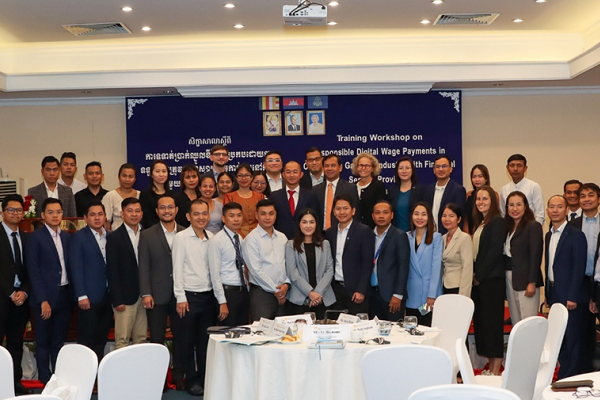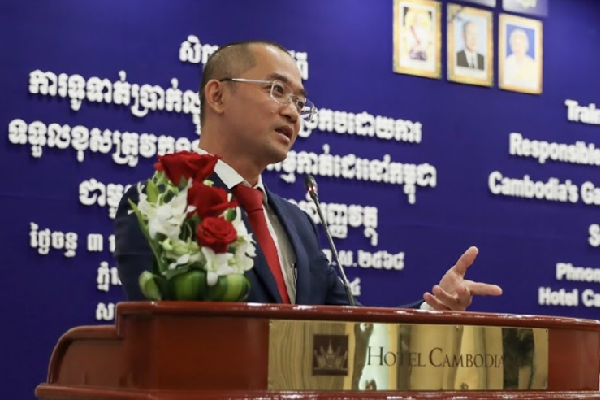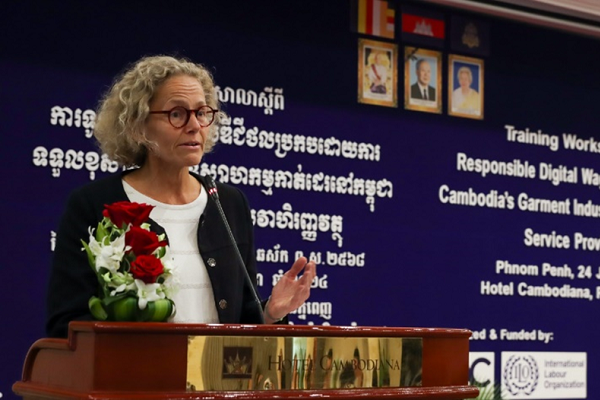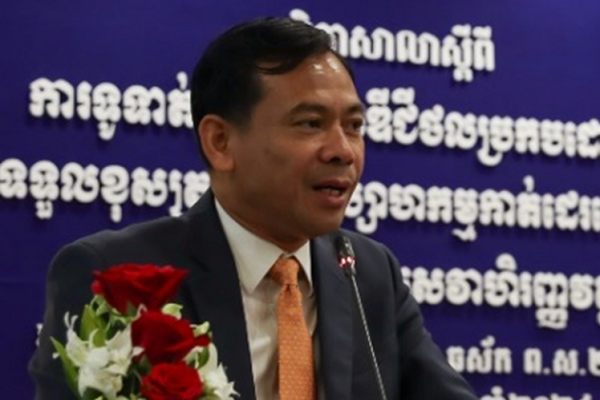Contact us: digitalwages@ilo.org
ILO, NBC, ABC and TAFTAC engage financial service providers in the promotion of responsible digital wage payments in Cambodia

On 24 June 2024, Better Factories Cambodia (BFC) and the ILO’s Global Centre on Digital Wages for Decent Work partnered with the National Bank of Cambodia (NBC), the Association of Banks in Cambodia (ABC), and the Textiles, Apparel, Footwear and Travel Goods in Cambodia (TAFTAC) to host a one-day workshop for the financial sector and support organizations. This training workshop aimed to facilitate dialogue on the challenges and opportunities for scaling up responsible digital wage payments and associated financial services in Cambodia’s garment sector.
The event attracted around 50 participants, representing NBC, ABC, the Cambodian Association of Finance and Technology, 15 financial institutions (including local banks, Mastercard, Visa and UnionPay International), eight support organizations, garment factories and employer associations actively involved in wage digitization.
The garment sector has made significant strides to transition to digital wage payments. As of June 2024, 506 factories engaged with BFC – representing 72 per cent of the total of member factories and 84 per cent of the workforce – have begun paying wages electronically. Evidence also shows that despite the shift to digital wages, workers’ usage of digital financial services remains limited. These results suggest that more needs to be done to complete wage digitization in the sector and ensure that workers, in particular the most vulnerable, fully benefit from financial inclusion through digital wages.
The workshop provided an opportunity to discuss the progress and challenges specific to Cambodia’s garment sector transition. The participants could for the first time explore the concept and principles of responsible digital wage payments and reflect upon their own context. Building on NBC’s experience with leveraging its blockchain-enabled payment system – Bakong – for enabling choices of payroll accounts for workers and Boost Capital’s recent success in engaging clients and promoting their financial literacy through a tech platform, participants then engaged in in-depth discussions on designing inclusive and scalable digital wage solutions to advance the transition in the garment sector.

Ly Bunsom, First Secretary General of the National Bank of Cambodia, delivered opening remarks
During the opening ceremony, Ly Bunsom, First Secretary General of the National Bank of Cambodia, gave inspiring remarks: “The National Bank of Cambodia has been at the forefront of promoting financial inclusion and advancing payment system infrastructure. I urge factories to pay wages in Khmer Riels to workers through digital payments using Bakong. This cutting-edge technology provides a seamless, secure, and efficient payment system, enhancing connectivity, reducing transaction costs, and promoting the use of local currency. Digital wage payments can significantly improve workers’ lives by offering safer, faster, and more convenient ways to receive their wages and make transactions.”

Valerie Breda, Technical Expert, ILO’s Global Centre on Digital Wages for Decent Work, delivered her remark during the opening session of the workshop.
Valerie Breda, Technical Expert at the ILO’s Global Centre on Digital Wages for Decent Work highlighted that “digital wage payments, when designed and offered responsibly, can empower men and women workers, and broaden their financial inclusion. It can also promote payroll efficiency and encourage greater respect of workers’ rights.”
The workshop enabled rich and open discussions and knowledge exchanges. On the one hand, the participants clearly recognized the benefits of wage digitization for workers and factories. The financial sector actors saw an opportunity for market growth through increased outreach, new services and products as well as cross-selling and referral business. On the other hand, participants stressed several challenges to a successful transition, such as an underdeveloped digital payment ecosystem, the culture of cash among workers, their weak financial and digital literacy, the employers’ concerns about benefits of transition and operational challenges, and the high operational costs for financial service providers to serve small enterprises.
The participants identified the need for worker-friendly financial solutions, accessibility through stronger ATM networks, greater adoption of the universal QR code system for payments (KHQR), standardized user interfaces and enhanced digital and financial literacy. Finally, the participants stressed the importance of continued engagement and collaboration between financial service providers, factories and their business associations, brands, unions, government institutions and support organizations to address the remaining challenges and promote a responsible adoption.

Rath Sophoan, Chairman of the Association of Banks in Cambodia, spoke during the workshop.
As Rath Sophoan, Chairman of ABC, highlighted, digital wages offer security and timeliness, and access to a broader range of financial services, including savings, credit and insurance, can significantly enhance worker resilience. This requires collaboration so that solutions are accessible, affordable and meet the specific needs of garment workers.
BFC and the ILO’s Global Centre on Digital Wages for Decent Work will continue their partnership with the NBC, the financial sector, social partners, support organizations and supply chain actors to support factories and their women and men workers and accelerate the transition to responsible digital wage payments in Cambodia’s garment industry and other economic sectors in Cambodia.
